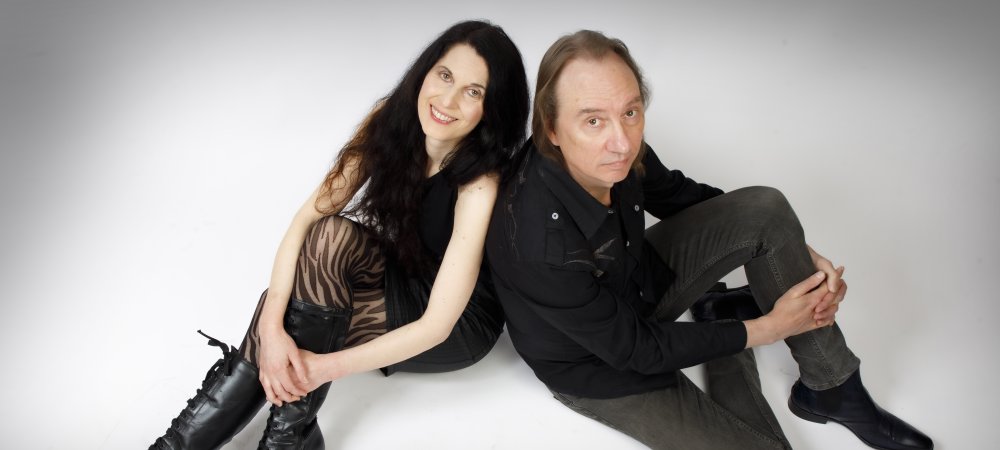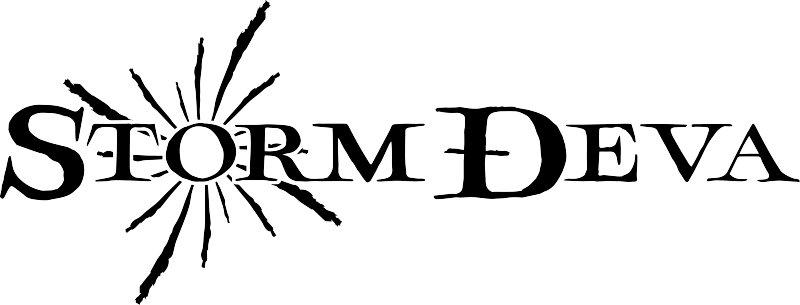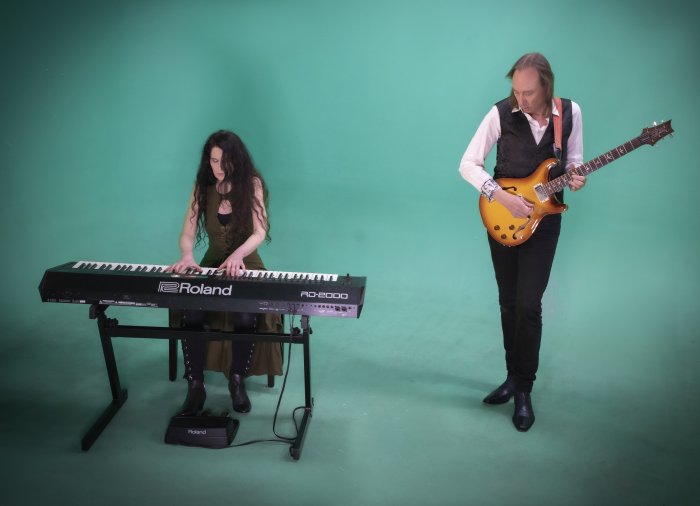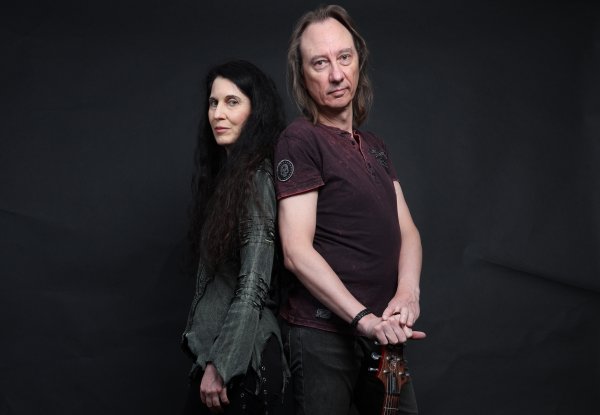A week or two before Christmas, TPA’s Roger Trenwith sat down with Carollyn Eden and Stuart Clark, a.k.a Storm Deva, and they had a good old natter, discussing their backgrounds, how the band formed, their influences and the recently released self-titled debut album…
What is the origin of the name, Storm Deva?
Carollyn: First of all, and not to be picky, it’s Storm Deva (pronounced “Déva”).
Ah, sorry!
C: Don’t worry. It doesn’t matter. Deva being an elemental spirit. Some years before I met Stu I was just looking for a great name for the music I put out there, and I was looking for something a bit magical. I was picking names, searching for them online and finding they had already been taken and so were unavailable. Eventually, I came upon this spirit called the Storm Deva, so I looked it up, and I just thought it was brilliant because it incorporates drama and it also has that kind of magical element to it.
I did look it up myself, and reading about it, “Deva” seems to be the male form, and “Devi” is the female form of this spirit. I just wondered why you chose the male form over the female form?
C: It seems from the website I found that the sexes of the storm spirit are interchangeable, but they didn’t really talk about it, and they actually depicted them as delicate females. So it’s open to interpretation. It’s a storm spirit that to us can be female or male, and it’s all imaginary. It’s all just magical ideas. You can have a wind or a water deva, and storm devas. And as Stu said to me, they’re doing the bidding of the gods or the angels depending on what kind of story you read.
I always like making up stories, hence writing lyrics. I like to imagine that each of us has this inner drive and the storm deva part of your instinct is the ability to overcome any difficulty.
Yes, that ties in with something else I was going to ask, because the theme of all the lyrics is overcoming adversity.
C: Yeah, yeah, yeah! So it fits in beautifully once I thought about that. And that’s why I called that song Storm Deva, that’s about overcoming that sort of deep pain within, in that song, “Here I am, this pain within me”.
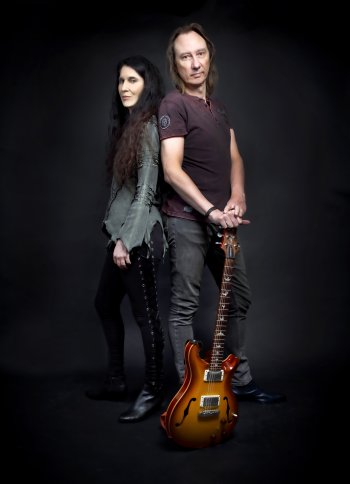 Moving on, how did you meet musically?
Moving on, how did you meet musically?
C: We met on a show we were both involved in called The Enlightenment Café.
How long ago was that?
C: (to Stuart) This is 2012, isn’t it? I think it was 2012. I was an incredibly last-minute addition (to the show). Stuart was one of the main people.
Stuart: I did the emceeing there because of my background in science and science popularisation, and they wanted to do this version of a Victorian music hall or science exhibition, and then Carollyn came in right at the last minute to do some music.
C: I was at Canada Water Station going to do a gig at Hanselhaus Museum with my early music trio. I saw a guy, not Stu, who was actually the director of The Enlightenment Café, and he was carrying a very strange guitar case. It was what looked like polystyrene. I thought, “well, that’s weird!” And I was in a chatty mood because I’m going to a gig myself, and I talked to him. He said, “Oh, you do historic music? Could you come and do some Victorian music, sing and play the piano?” So I was at the door of The Enlightenment Café singing to people and playing music, and that’s how we ended up on this show together.
Coincidences like this make the world go round! What are your musical backgrounds?
S: From a very early age, I loved the sound of a guitar, I just absolutely loved it. The other huge influence, was that when I was 10 Star Wars came out in the cinema. The music for that just knocked me sideways and still does. So I’ve had these two distinct musical loves for all this time, really. Where I found that the sonic world of the guitar had the same level of ambition as say, a John Williams orchestral score was in the world of prog. I gravitated more towards the rockier sounding bands. My great love was Rush, I’ve followed them for decades. Saw them over 50 times live, and I still get a constant source of inspiration from them. My trajectory through college was to go towards science. I became an astronomer, and my career has mostly been in science communication and science journalism, but I’ve always played guitar and played in bands. And when Carollyn played me her music, it just sounded so big and ambitious. All she had was the piano and her singing, but I could just hear the kind of power that was in the music. It just seemed to me that it required a rock setting to, you know, to really set it off.
I did like the set at Prog the Forest, and because there’s just two of you, it’s very stripped back. I thought that actually worked really well. Obviously it sounds very different to the full band line-up on the album, but it still had that basic power behind it, it felt really good.
S: Thanks, that’s nice of you to say that, Roger, because economics and opportunity determined that for this first round of gigs, it should just be the two of us. We knew that we didn’t just want to produce anaemic versions of what was on the album, so we both worked really hard to find convincing arrangements. Where things needed to be beefed up we changed the way we would play that part, and we also ended up putting new sections into the songs to take advantage of the new acoustic arrangements. And I felt very confident that we could do that because Carollyn will tell you her musical background, which is an absolutely proper pukka music background, not like mine! The power of the songs had come through, as I said, when she played me just the piano demos, and so we felt we could capture it again, in the acoustic environment.
C: I’ve basically done music since year dot. My mum also played piano and was a piano teacher when I was at home, and I started playing piano apparently when I was, like, 2 or 3, finding melodies. I just thought this was the most thrilling thing performing in front of people (from an early age), all through school so I learned the flute, right up to grade 8, got distinction as well, and piano was big for me. I sang in endless choirs from about age 13, and my whole life was just music.
Now the interesting thing is I didn’t listen to pop music at all, this was in the eighties. It just wasn’t for me, and I didn’t know rock music back then. Now, I know that I would have been a Goth if somebody had showed me rock music in those years! But anyway, my whole life was basically classical music. I went almost every evening after school to a music group as well. And I went to the opera. Some friends had a box there, and I love drama, so this was just fantastic for me. I just loved everything… musicals were a big influence. My earliest singing heroine – and she’s a really big influence – is Julie Andrews. After that came Barbra Streisand for a while and some classical opera singers.
I was a northern girl, but with French and German and English and Scottish mixed in my family. We lived in Yorkshire, with my German mother, and half-French, half-English dad. Then I came to London, I went to the Guildhall School of Music. I did a degree with piano as my first study, but I knew that I didn’t really want to be a classical pianist, I wanted to sing. I wanted to sing, as I was a cantor at Leeds Cathedral. I did lots of solo singing at the cathedral but I hadn’t developed it. Somehow, I hadn’t moved on, and I couldn’t have done opera at the time, so I didn’t do it at the classical music college as a main thing. Once I left, I still desperately wanted to sing, and so started a journey of going to about ten or more singing teachers doing different things, including classical, jazz singing, and musical theatre taught by Mary Hammond, who was ‘Queen of the West End’ at one point.
To cut the story short, by the time I was in my twenties I was encouraged by my brother and my boyfriend at the time to write songs. The first songs I ever wrote were in my late twenties, early thirties. I had some interest there and got compared to Kate Bush even though I hadn’t listened to her, really, although I had heard Wuthering Heights.
Ah, I didn’t mention Ms Bush by name, but I did actually make a reference to that in the album review.
C: That’s cool because she’s amazing. But I wasn’t influenced by her.
Well, on The Garden of Wisdom, there’s a vocal inflection that’s repeated a couple of times that has got Kate Bush written all over it.
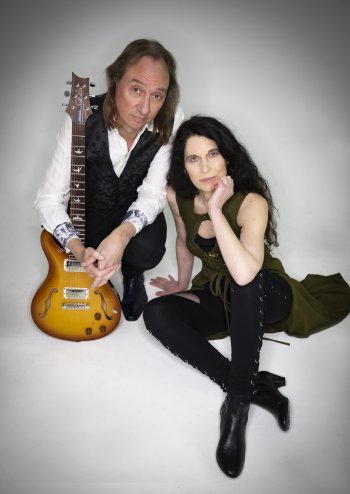 C: I’m influenced by classical coloratura and folk music. That’s how I came up with it. I did loads of coloratura, as I’m one of those sopranos that does all the little runs, which I love. I reckon she probably studied classically a bit as well. But, anyway, it’s cool to be compared to Kate Bush because she’s so incredible. Who wouldn’t say, “Yeah, that’s great!”
C: I’m influenced by classical coloratura and folk music. That’s how I came up with it. I did loads of coloratura, as I’m one of those sopranos that does all the little runs, which I love. I reckon she probably studied classically a bit as well. But, anyway, it’s cool to be compared to Kate Bush because she’s so incredible. Who wouldn’t say, “Yeah, that’s great!”
In about 2008, 2009, when I had my own music trio, I was into early music, that inspired me to write again. The simplicity and beauty of music from the Renaissance and Baroque time – really early Baroque – and I was at a time in my life when there were a lot of very big, dramatic things happening as you can hear in the lyrics – some very, very difficult stuff going on. I poured all my energy into transforming it into music.
A few years later, I met Stuart, and by then I’d discovered rock music and knew I wanted those colours in the music. My big influences are Iona, and Enya. Also, All About Eve, were one of my biggest influences as well. There are quite a lot of others too. I listened to Fairport Convention, Fairground Attraction. I was introduced to masses and masses of rock music and folk music in my twenties by my boyfriend at the time, who had a huge wall of LPs! I love Pink Floyd and electric guitars became my favourite instrument, so from then onwards I always wanted that rock sound in there.
And now you’ve got it! Tell me something about your songwriting process.
C: It always stems out of an emotion, a feeling that I want to express, which then transforms into words and music. It comes from sort of a deep kind of need; something I have to express. It comes from a feeling place, not a thinking place. Often, the music and the words come simultaneously, and then I might go back and do more verses, the lyrics afterwards.
Would you say that Stuart has to add his particular sound to a song to turn it into Storm Deva rather than just your song?
C: I think it’s absolutely a marriage of the two of us because I have loads of ideas for the instruments, and I’m quite good at writing bass lines, actually. So I’m really into bass, Stu’s amazing at drums. I mean, he is the master, he worked so closely with Rob [Robert Brian – drums on the album]. And then guitar, I’ll have some key ideas, even occasionally guitar riffs and then Stuart “guitarifies” it from my piano playing. I would say the Storm Deva sound is absolutely a marriage of the two of us.
You both have to be there to make it the whole.
C: Yeah, we’re totally in tune, and we totally hear the same kind of things. But, yeah, really, the two of us. It’s Storm Deva, and the sound of Storm Deva is us.
Stuart, how do you go about translating your idea into action, as it were? How do you go about it?
S: Most of the time it starts with the piano demo I get from Carollyn, and I just listen to it over and over again. Sometimes guitar ideas immediately happen, and other times, I just think, well, I can’t add anything to that, it’s complete as it is. Then I put guitars on it anyway! ????
C: At first, Stu was a little bit nervous about making it too rocky, but I was going, no, I really want that. I love metal guitars, I love Nightwish, and I’m huge into Iron Maiden. So, Stu then came up with more and more amazing creative things. There are two songs in particular on the album, one of those is The Journey, the last song on the album. Stu had this lovely guitar riff, the chords inspired me to come up with the beginning of the song. And then Carpe Diem, I had most of it done, but something was missing. I was scrolling through my phone where we record things on an app, and I came across a guitar riff Stu had played from months previously, and it happened to fit the chords, just lovely, and that became a key element, the opening of the song in fact. Those two songs, we are joint writers on that, it’s all a collaborative thing.
S: We just see what works and what doesn’t. Carollyn has so many musical ideas that, occasionally, she gives me a piece to listen to that moves too quickly through its ideas and I find that I just wanna hear the really cool bit a little more before we move on, or I want to come back to it later in the song.
There’s definitely a definitely a yin and yang thing going on there, isn’t there?
S: Definitely, that’s why I think the sound is both of us, you just can’t separate it.
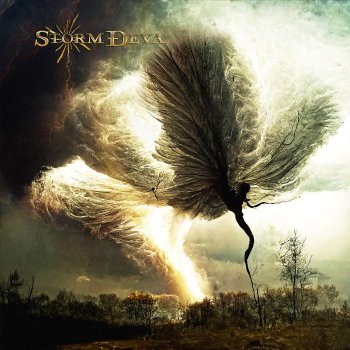 C: Just to add to how much we love the process of arranging the songs. Scoring is always something I really enjoy. It is all about colour and textures. When I have finished writing a song on piano and voice and Stu and I begin arranging the songs, I sketch in any ideas I have for the other instruments on midi instruments in Logic and then develop these. Stu also simultaneously works on the Logic project creating guitar parts. We keep batting ideas back and forth collaborating on the arrangement until we are ready to send this to the other instrumentalists. I sometimes write out cello parts which Hannah can then develop, same with some of the bass parts. Stu has many detailed ideas for drums and sends those ideas to Rob. As we said it really is a completely collaborative process between Stu and myself creating the sound world of Storm Deva and something that took a lot of experimentation on the first songs until we found the Storm Deva’s sonic world. We are very lucky to work with three other amazing musicians who took our vision and then put their creativity into making this all come alive in each part.
C: Just to add to how much we love the process of arranging the songs. Scoring is always something I really enjoy. It is all about colour and textures. When I have finished writing a song on piano and voice and Stu and I begin arranging the songs, I sketch in any ideas I have for the other instruments on midi instruments in Logic and then develop these. Stu also simultaneously works on the Logic project creating guitar parts. We keep batting ideas back and forth collaborating on the arrangement until we are ready to send this to the other instrumentalists. I sometimes write out cello parts which Hannah can then develop, same with some of the bass parts. Stu has many detailed ideas for drums and sends those ideas to Rob. As we said it really is a completely collaborative process between Stu and myself creating the sound world of Storm Deva and something that took a lot of experimentation on the first songs until we found the Storm Deva’s sonic world. We are very lucky to work with three other amazing musicians who took our vision and then put their creativity into making this all come alive in each part.
With debut albums it’s often the case that the songs that appear on it have been around for a long time. Was any of that the case here?
C: Yes. The writing goes back to… let’s think… 2010! Alchemy is one of the very first songs, Believing, there’s a whole load of them that I’d written before we met.
They all fit this theme of rising up against adversity, and there’s a kind of eternal optimism that’s going through it as well, which is good. It’s all very uplifting.
C: Yeah, absolutely! I don’t just want to write anything, I want to write a song that empowers me, that makes me feel free. It gives me a strength, it wants to be a good, positive voice.
S: The best gigs that I’ve ever been to and the bands that I’ve loved the most are always the ones that by the end of the night you feel better than before you went in, you know, and that they entertain you, for the two hours or whatever, you’re on planet Iron Maiden or you’re on planet Rush or whatever, you know? It’s very important to me that when we go out and play for people, we uplift them, we entertain them, we excite them.
How many gigs have you done so far?
C: Just four. Piano Smithfield, supporting the amazing Genesis Piano Project, was our first London gig. We have been going to house concerts in Cambridge, organised by Geoff and Beth Parks. They asked us to come and play, which was our first ever gig.
S: It felt absolutely great doing that concert for Geoff and Beth, they have been so supportive.
Do you get stage fright, nerves at all before you perform?
C: I love performing, it’s my happy place. Of course, one gets nervous, but part of it is riding the waves. I was very shy, very quiet, when I was younger but where I felt I had my voice was when I was performing. So, I feel in the zone, happy.
It must be the waiting to go on stage that’s the worst part of it, hanging about. Charlie Watts famously said of his time in The Rolling Stones, he’d been in the band for 50 years or whatever it was, and about 45 years of that was just hanging about!
S: Yeah! I think the key to being confident on stage is just to be really well practiced beforehand. You need to be confident in your own ability, so at any given moment you know exactly what you’re playing.
It actually surprises me that I like your music so much because my musical thing, I like darker stuff and more avant garde music as well. Your music isn’t the sort of thing that I would’ve sought out, but it has struck a chord, which is a bit odd, really! It works!
C: Oh, wonderful. This is wonderful to hear, actually, Roger!
What was it like having to step in at the very last minute for Prog the Forest?
S: Originally, when we got the invitation at 7pm the night before, I said no. I had just walked back in from work that day, and we were planning to go to the gig as punters and just have a relaxing day, just listening to the bands, you know? We had bought tickets. So, initially, I just said, no. I just can’t get my head around it. I’m so tired. But then… you know it’s a great opportunity.
I wouldn’t be doing this if you hadn’t done it, so there you go!
S: Well, exactly!
C: I said, look, I can even just go and represent us and play the piano. I was going to just go there and play it solo if I needed to. I just thought if they need somebody to do something, I’m happy to go anyway, but, obviously, so much better if it’s both of us. So we had something to eat and then we just went to our instruments and had a run through of the songs. We’d been recording our acoustic stuff the week before, and we realised that we were gig ready, so that was it!
S: Because we’re so happy with these acoustic versions, we’ve been recording some of them to put out on an EP so that people can have both versions of them. So, yeah, we literally walked to our instruments, did no preparation whatsoever, and just sat down and played the set through that Saturday evening.
Well, I’m no musician, but I didn’t spot any bum notes!
S: Yeah, there were a couple from me!
C: You just ride it out, you don’t show anything, and you just ride it.
S: So we text messaged Chris Parkins and said, okay, we’ll do it! So we had another run through on the Sunday morning, packed the gear in the car, came down, and, just said, okay, we’re here! Just tell us when you want us to set up and when you want us to play. Because it was such a high profile gig, the last thing I wanted to do was play a bad gig because I was a bit tired but, anyway, it worked out!
I’m glad you did it!
Do you mind being pigeonholed as prog? Because in my view, I think all these genre definitions are a bit pointless. It’s either music you like or music that doesn’t do anything for you.
S: It is what it is. The thing about our music is there’s no artifice about it, it’s not trying to be anything. However people want to see us, pigeonhole us, that is totally fine.
C: We simply hadn’t thought of a label. As you said music just is what it is. I didn’t even know that there was any music called prog happening now! Discovering the prog community has been wonderful, because here is a group of people just like those who listen to classical music, who are willing to listen in to music of all types that have a rock element. It is wonderful how we have been welcomed into this community and we are completely happy for people to label us as they choose. We just love sharing our music!
Stuart, how do you fit in gigs, rehearsals, writing, recording with the obviously high pressure career that you’ve got? How do you fit it all in?
S: Yeah, it is difficult, but I’m entirely freelance so it’s not like I have to be in an office 9 until 5. And my work is contract and project based, so I have that level of flexibility to it.
Does the band pay for itself?
C: Not yet. We are still very much at the beginning. We’ve spent out a lot more than we’ve got back of course, but you just don’t want to go in debt, you know? You don’t want to lose money, but you don’t worry about making money at the beginning. It’s just about getting it out there.
S: As you know, any business, when it’s starting needs investment. So we have invested because the most important thing for us was that when we finally released Storm Deva, it was fully formed, and it wasn’t something that had a few rough edges because we had cut some corners. So we worked over a number of years to get the right equipment to record ourselves, the right musicians recording the other parts and we said from the very beginning that it wasn’t going to be a charity. We paid all the musicians properly for their time. We paid John Mitchell to have it mixed properly. We paid to have it all designed properly, and now we’re so proud of the final product. It’s been worth every penny, because we fully, fully believe in it.
Rightly so!
Where did you find the rest of the band?
C: Hannah Reeves plays cello. She was a part of my early music trio, one of the founding members actually, we formed The Nightingale Consort together. Dan Giles, played bass. I found him on the Musicians Union list of musicians, and Rob Brian plays drums and percussion. He was playing with Loreena McKennitt in Birmingham, and I’m a big Loreena McKennitt fan. We went to watch the gig, and thought Rob’s drumming was great. I said afterwards, oh, maybe, maybe…
S: Well, we both thought, yeah he’s the one, but I just wanted to make sure that he could rock out a little bit more than he was doing with Loreena. A quick google of him showed that he had played with Siouxsie Sioux, so he did indeed know how to rock! And I also found a drum solo he had played at a music show. He was just incredible, so inventive. Like Neil Peart used to do for Rush, he brought so much more than just a back beat to the music. Even now, after years of living with our songs, Rob’s work on the album never fails to give me the chills – in a good way! But that’s true of Dan’s work, and Hannah’s too.
Well, thanks a lot to both of you for an informative chat. I look forward to seeing you gigging soon, and best of luck for the future!
You can read Roger’s review of Storm Deva’s debut album HERE.
LINKS
Storm Deva – Website | Facebook | Bandcamp

